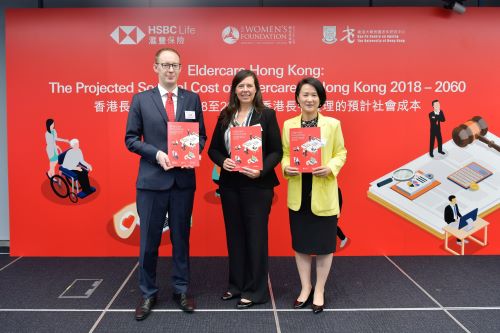

(L-R) Edward Moncreiffe, CEO, Hong Kong, HSBC Life; Fiona Nott, CEO of The Women’s Foundation; and Dr Vivian Lou, director of the Sau Po Centre on Ageing, The University of Hong Kong
As Hongkongers live longer, the cost of taking care of the elderly is expected to grow 570% by 2060, according to a joint study by the Sau Po Centre on Ageing at The University of Hong Kong, The Women’s Foundation, and HSBC Life.
The research, titled ‘Eldercare Hong Kong: The Projected Societal Cost of Eldercare in Hong Kong 2018 to 2060’, estimated the future economic cost of eldercare in Hong Kong in the coming decades, based on cash flow models built by HSBC Life.
It found that the cost of taking care of the city’s elderly – whether through a subsidised or non-subsidised assisted-living facility or at home – is expected to reach HK$222.4 billion (US$28.34 billion) per year in 2060. This marks an increase of 5.7 times from the current cost of HK$38.8 billion per year.
According to the study, around 342,000 people, or approximately 5% of the total population, received eldercare in 2018, and a total of 45,000 working adults provided eldercare for a family member.
The number of eldercare recipients is projected to double in 20 years’ time to 729,000 and reach 890,000 by 2060 (11% of the population). Meanwhile, the number of informal caregivers will also double to 89,000 in the next 20 years, and then further increase to 97,000 in 2060.
Edward Moncrieffe, CEO of HSBC Life in Hong Kong, said the study’s findings that the number of Hongkongers receiving and giving eldercare is expected to double within the next 20 years should serve as a wake-up call.
“With increasing life expectancy and the demand for eldercare increasingly outstripping available supply, the outcome may be significant costs to employers and employees,” he said. “It’s critical that individuals and employers take actions now to reduce what will otherwise be a substantial burden on Hong Kong society.”
Meanwhile, indirect costs to employers and informal caregivers, in terms of lost employee productivity, will also rise sharply. By 2060, employers’ losses will be approximately HK$4.8 billion, while for informal caregivers, the total opportunity costs are projected at HK$7.2 billion. These represent 470% and 400% increases, respectively. Majority of caregivers are women, with 58% in 2018. By 2020, this figure is expected to increase to 62%.
In order to address the problem, the study recommended public-private partnerships, as the burden will be felt by all levels of society. It stressed the importance of developing a creative response by engaging the government, employers, individuals, and financial institutions.
The government was called on to formulate a long-term strategy for family caregivers. Employers were urged to create a welcoming culture for people who combine work with caregiving responsibilities. This culture includes being open to requests for flexible work times and remote work, which can help businesses retain skilled people who might otherwise leave their jobs.
Individuals, according to the study, should think about how they can prepare, both psychologically and financially, for potentially becoming caregivers themselves. And finally, it encouraged the insurance industry to develop innovative products and services that enable caregivers to make provisions for their elder dependents.
